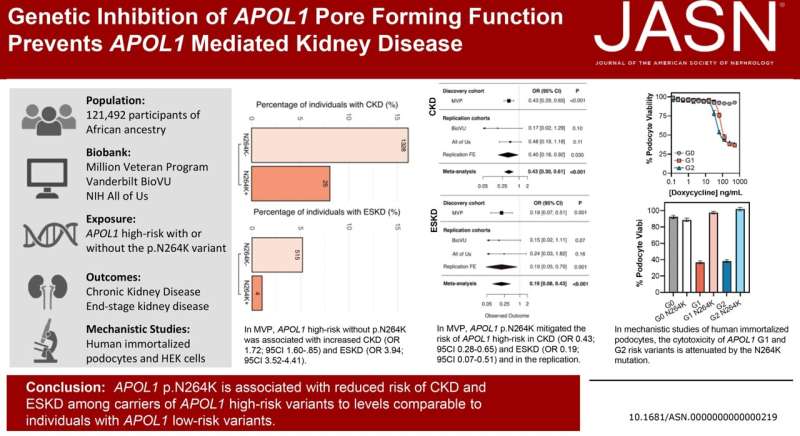This article has been reviewed according to Science X's editorial process and policies. Editors have highlighted the following attributes while ensuring the content's credibility:
fact-checked
peer-reviewed publication
trusted source
proofread
Kidney disease gene found to also have a protective mutation

African Americans have long been known to be at increased risk of kidney disease due to a dangerous genetic mutation that creates a hole in the kidney cells, but Vanderbilt University Medical Center (VUMC) researchers have now discovered a protective genetic mutation that covers the hole to eliminate the risk.
The findings on the apolipoprotein L1 (APOL1) gene, published today in the Journal of the American Society of Nephrology, could have immediate and broad implications for kidney health because people with both the disease-causing and protective mutation are not at increased risk.
"Our team discovered a different protective genetic mutation in APOL1 that counteracts the disease-causing mutation," said senior author Alexander Bick, MD, Ph.D., assistant professor of Medicine, Division of Genetic Medicine. "We performed experimental studies and found that the harmful mutation creates a hole in kidney cells. Our protective mutation blocks the hole.
"There are medicines in late-stage clinical development that block the APOL1 hole just like our protective mutation does. Our study shows that these targeted personalized medicine drugs are likely to be a successful treatment strategy. Our results also identify a set of patients with both the harmful and protective APOL1 mutation who would not need this treatment," he said.
The large human genomic study looked at of 150,582 participants with African ancestry from the Million Veteran Program (MVP), BioVU (VUMC's de-identified DNA databank) and the All of US Research Program, the NIH's historic effort to collect and study data from 1 million or more people living in the United States to accelerate health research.
"The results of our study have immediate and broad implications for kidney health," said lead author Adriana Hung, MD, MPH, associate professor of Medicine, Division of Nephrology, and principal investigator for the kidney disease grant for the Million Veteran Program from the Department of Veterans Affairs. "Individuals with African descent and Latinos have a four-fold increase in the risk of progressing to end stage renal failure, which is partially explained by of APOL1 G1/G2 high risk variants."
"Additionally, kidney donors with APOL1 high risk variants are also at an increased risk of kidney disease, hence reducing the pool of kidney donors. Interventions to decrease these long-standing inequities in kidney health have been desperately needed," she said.
The authors are now evaluating the role of APOL1 high risk variants in different settings to understand the overall population that will benefit from pharmacologic inhibitors that mimic the genetic mutation by blocking the APOL1 pore formation and ion channel conduction.
"Our study represents an important step forward in precision nephrology," Hung said. "It is an extraordinary example of how human genomics studies translated into the discovery of new treatments."
More information: Adriana M. Hung et al, Genetic Inhibition of APOL1 Pore-Forming Function Prevents APOL1-Mediated Kidney Disease, Journal of the American Society of Nephrology (2023). DOI: 10.1681/ASN.0000000000000219




















